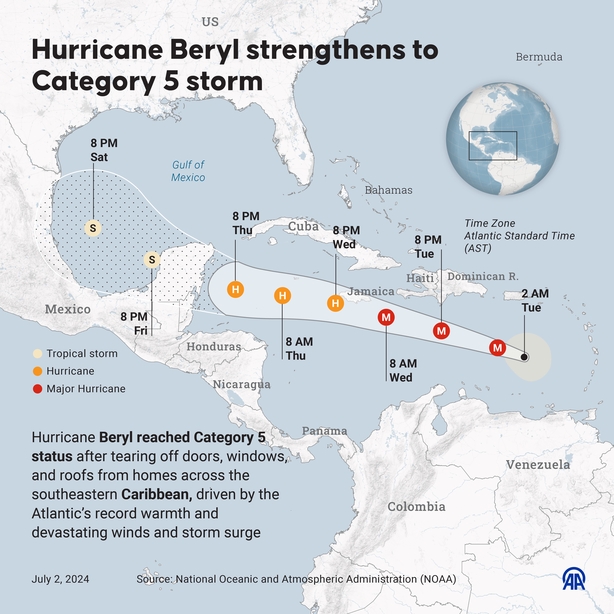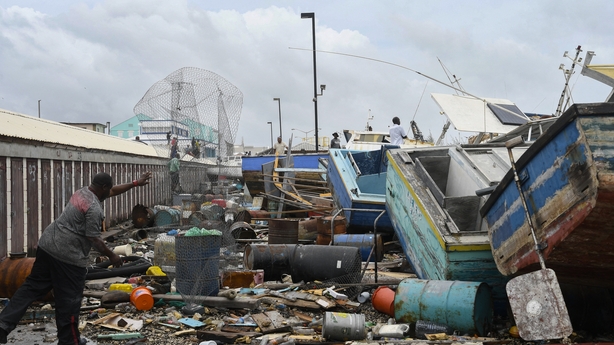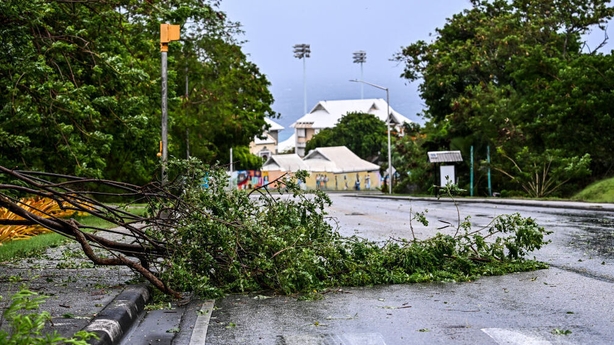Hurricane Beryl is heading towards Jamaica as a Category 5 storm after making landfall on smaller islands in the Caribbean, downing power lines, bringing floods and reportedly killing two people.
The storm made landfall yesterday on Carriacou island, part of Grenada, where one person was killed, and power was cut island wide.
Another person was reportedly killed in St Vincent, although Reuters could not immediately verify this.
Video from Barbados showed waves pounding the shore of the island, breaching walkways, felling palm trees and flooding roads in the capital Bridgetown.
In St Vincent and the Grenadines, the "hurricane has come and gone and it has left in its wake immense destruction," Prime Minister Ralph Gonsalves said.
"Union Island (part of the Grenadines archipelago) has been devastated," he said, with "90% of the houses... severely damaged or destroyed".
Mr Gonsalves confirmed one person had died and that there could be more fatalities.

Hurricane Beryl is expected to bring four to 12 inches of rainfall to Jamaica tomorrow, possibly triggering flash floods, the US National Hurricane Center (NHC) said.
As of 1200 GMT (1pm Irish time), the storm, packing winds of up to 250km/h, was about 1,006km east-southeast of Kingston, Jamaica's capital, it said.
Dozens of vessels in the storm's path risk being affected, with diversions seen in the Caribbean, according to Vortexa, which provides energy-cargo tracking data.
The unusually early timing and rapid intensification of the storm, the first in this year's Atlantic hurricane season, is partly due to warmer ocean temperatures, scientists said.
Jamaica issued a hurricane warning yesterday, while tropical storm warnings were in effect for parts of the southern coasts of the Dominican Republic and Haiti.
The "potentially catastrophic" storm struck the Caribbean region earlier today as a Category 4 storm and was expected to bring life-threatening winds and a storm surge to Jamaica.

While it has picked up to a Category 5 on a five-point scale, it is expected to become less intense later, NHC said, with Beryl's centre forecast to "pass near Jamaica on Wednesday and the Cayman Islands on Thursday".
Across other islands in the eastern Caribbean, residents had boarded up windows, stocked up on food and fuelled up cars ahead of the storm.
Officials in Mexico have begun to prepare for Beryl's arrival later this week, with the federal government urging authorities and citizens to show "extreme caution".
UN climate chief's family impacted by Hurricane Beryl
UN climate chief Simon Stiell has warned that the destructive consequences of global warming are "not a tomorrow problem" after Hurricane Beryl swept across several Caribbean islands.
Mr Stiell hails from the island of Carriacou which took a direct hit early yesterday as Beryl barrelled through, dumping heavy rain and unleashing devastating winds.
His late grandmother's home was among those destroyed while his parents' property also suffered damage, his office said.

Mr Stiell said whether the hurricane in his homeland or floods and heatwaves elsewhere in the world, climate change was "pushing disasters to record-breaking new levels of destruction".
"This is not a tomorrow problem," the executive secretary of the UN Framework Convention on Climate Change said.
"This is happening right now in every economy... disasters on a scale that used to be the stuff of science fiction are becoming meteorological facts, and the climate crisis is the chief culprit."
The NHC said Carriacou bore the brunt of the storm's "extremely dangerous eyewall" that brought sustained winds at upwards of 240km/h.
Grenada's Prime Minister Dickon Mitchell said the island was "flattened" in half an hour and that it was not clear yet if anyone had been killed in the trail of destruction.
Mr Stiell said the "colossal climate costs" inflicted by natural disasters had now reached the level of a national security threat "from the smallest islands to the biggest G20 economies".
Wealthy nations have agreed to pay $100 billion (€93 million) annually to help the developing world adapt to climate change and switch to clean energy but experts say trillions will be needed in the years to come.
It is expected a new finance target will be set at the UN COP29 summit in Azerbaijan in November, though divisions over the size and scope of that goal have frustrated negotiations.
Climate change
Global warming has helped push temperatures in the North Atlantic to all-time highs, causing more surface water to evaporate, which in turn provides additional fuel for more intense hurricanes with higher wind speeds.
In May, the US National Oceanic and Atmospheric Administration predicted above-normal hurricane activity in the Atlantic this year, also pointing to unseasonably high ocean temperatures.
Scientists surveyed by Reuters see Beryl as a harbinger of an unusually active hurricane season made possible by record high temperatures in the Atlantic Ocean.
"Climate change is loading the dice for more intense hurricanes to form," said Christopher Rozoff, an atmospheric scientist at the United States' National Centre for Atmospheric Research in Boulder, Colorado.
Beryl jumped from a category 1 to a category 4 storm in less than ten hours, said Andra Garner, a meteorologist based in New Jersey.
Scientists have already predicted that events like Beryl will grow more likely with climate change, added Ms Garner, whose research has shown that rising water temperatures over the last five decades have made it more than twice as likely for weak storms to grow into major hurricanes within less than 24 hours.


